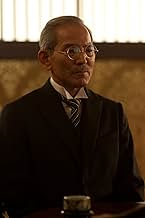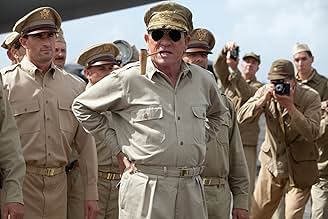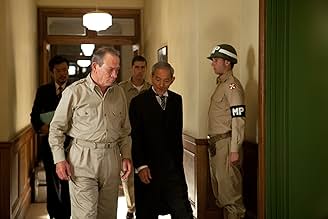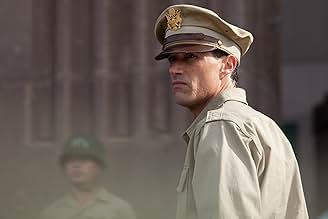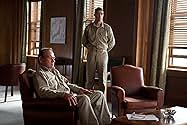Ajouter une intrigue dans votre langueAs the Japanese surrender at the end of World War II, General Fellers is tasked with deciding if Emperor Hirohito will be hanged as a war criminal. Influencing his ruling is his quest to fin... Tout lireAs the Japanese surrender at the end of World War II, General Fellers is tasked with deciding if Emperor Hirohito will be hanged as a war criminal. Influencing his ruling is his quest to find Aya, an exchange student he met years earlier in the U.S.As the Japanese surrender at the end of World War II, General Fellers is tasked with deciding if Emperor Hirohito will be hanged as a war criminal. Influencing his ruling is his quest to find Aya, an exchange student he met years earlier in the U.S.
- Récompenses
- 1 nomination au total
- Hideki Tojo
- (as Shôhei Hino)
Histoire
Le saviez-vous
- AnecdotesThe romantic story between Fellers and Aya was entirely fictional for the film. Bonner F. Fellers was married in 1925 to Dorothy Dysart who accompanied him twice on his posting to the Phillipines, and she also went with him to China and Japan.
- GaffesIn the opening sequence the film makers use archival film showing an atom bomb being loaded into the bomb bay a B-29 for the attack on Hiroshima. The bomb shown is "Fat Man" and not "Little Boy" that was used on the attack on Hiroshima (8-6-1945). "Fat Man" was used in the second attack, three days later (8-9-1945) on Nagasaki.
- Citations
General Douglas MacArthur: I don't want the Communists in here. But Washington wants vengance on the emperor, because their voters do, and their voters have no fucking idea what's good for them.
In his rule over Japan as Supreme Commander of the occupying forces after World War II, General Douglas MacArthur was probably as benign a dictator as history has recorded. His enlightened policies led to a Japanese post war economic recovery from wartime devastation, and to post-war harmony between Japan and the West that replaced virulent wartime hatred. Emperor deals with his first days in Japan after the Japanese surrender, and in particular, with his momentous decision not to include the Emperor Hirohito among the Japanese war criminals, a judgement made despite political and popular clamor. Allied war propaganda had demonized the Japanese people and Hirohito in particular, and Japanese propaganda had done much the same with the other side. MacArthur's decision became the lynch-pin of his policy there: to respect the cultural differences instead of seeking to override them, and to try to bring together the best that both Japan and the western powers had to offer.
The movie deliberately avoids clarifying which emperor the title refers to. On the surface it may seem to denote Hirohito, but as supreme commander MacArthur had near imperial power, and did not hesitate to use it. The film concentrates on one of his protégés and close advisors, General Bonner Fellers, a Japanese expert on whose opinion MacArthur chooses to rely. Fellers was close to MacArthur, having served with him even before the war. Fellers loved Japan and had visited it, and had produced for the American military a crucial assessment of the Japanese military mind. He had additionally predicted war with Japan well in advance of Pearl Harbour. In real life, Fellers had some connections to Japan, even to the Imperial Household, and he had a close friendship with a former female Japanese exchange student whom he knew from Earlham College in Indiana. He rejoined MacArthur in 1943 and accompanied him during the Supreme Commander's momentous first days in Japan. The film strongly hints that MacArthur had already made up his mind about the treatment of Hirohito, which he almost certainly had, but wanted Fellers to supply the rationale for his decision.
The film has three threads that run throughout: MacArthur's occupation of Japan; Fellers' investigations leading to his written opinion; Fellers' search for his Japanese friend amidst the post-war chaos. It is one thread too many, since while the film juxtaposes these, it does not successfully weave them together. The one exception may be Fellers interview with the Japanese general, supposedly his friend's uncle, since it does much to explain the country's traditions and military attitudes. Director Peter Webber has said quite rightly that MacArthur has not been particularly successfully treated on the screen. In fact, epics like MacArthur (1977) and Inchon (1981) proved to be major disappointments. It seems a shame here that the director and writers Vera Blasi and David Klass did not keep MacArthur as the film's central figure, but instead chose to focus on his subordinate, Fellers.
As MacArthur, Tommy Lee Jones gives an outstanding performance, and the film is worth seeing for that alone. Looking nothing like MacArthur (he didn't try), Jones captures ever bit of "El Supremo's" command and self-confidence, and when he is present on screen, like the General himself, he dominates it. It is just a shame that he doesn't get more screen time. MacArthur is, historically, the man who made the real decisions, and, especially as played by Jones, a figure far more fascinating than Fellers.
By contrast, the part of Fellers (Matthew Fox of "Lost") seems dull, unfocused, and even clumsy, particularly considering the crucial days in which it is set. That is probably not Fox's fault, but a weakness of the screenplay. While the fact that Fellers knew Japan well and was especially friendly with a Japanese girl he had met in college are factors that deserve to enter into the picture, as presented they often tend to be a distraction from its central theme. This is all the more the case since the story of "Aya" appears to contain considerable fiction. Feller's real-life friend from Earlham, Yuri Wantanabe, survived the war, and his connections to Japanese officialdom were probably better than her own. There is the additional fiction that all this is compressed into a ten-day window, when the actual investigations took place over five months.
Still, in playing Aya, Eriko Hatsune renders her subtly, displaying a delicate balance between propriety and concern. Some of the other Japanese actors are equally notable. Especially fine, and especially central to the story, is the portrayal by Masatô Ibu of the Lord Privy Seal, Marquis Koichi Kibo, the highest figure in the Imperial Household and a friend to Hirohito. Ibu is persuasive in presenting a man who attempts to preserve the Emperor's honour – and his privacy – even in the face of the possibility that the Emperor might hang. Masayoshi Haneda also gives a fine performance as Fellers' interpreter and de facto aide. And Takatarô Kataoka is realistic as Emperor Hirohito himself.
The wanderings of the plot are offset in part by the great production values (Grant Major)and fine cinematography (by Stuart Dryburgh). The contrast between the real beauty of Japan and the wartime devastation is particularly effective.
This movie has many good things going for it, particularly Tommy Lee Jones (and MacArthur himself). It's just a pity it didn't capitalize on them more.
Emperor premiered at the Toronto International Film Festival on September 14, 2012. It has been acquired for distribution by Lionsgate & Roadside Attractions, but no date for general distribution has yet been announced.
Meilleurs choix
- How long is Emperor?Alimenté par Alexa
Détails
- Date de sortie
- Pays d’origine
- Sites officiels
- Langues
- Aussi connu sous le nom de
- Emperor
- Lieux de tournage
- Sociétés de production
- Voir plus de crédits d'entreprise sur IMDbPro
Box-office
- Montant brut aux États-Unis et au Canada
- 3 346 265 $US
- Week-end de sortie aux États-Unis et au Canada
- 1 014 099 $US
- 10 mars 2013
- Montant brut mondial
- 14 858 240 $US
- Durée1 heure 47 minutes
- Couleur
- Mixage
- Rapport de forme
- 2.35 : 1
Contribuer à cette page









